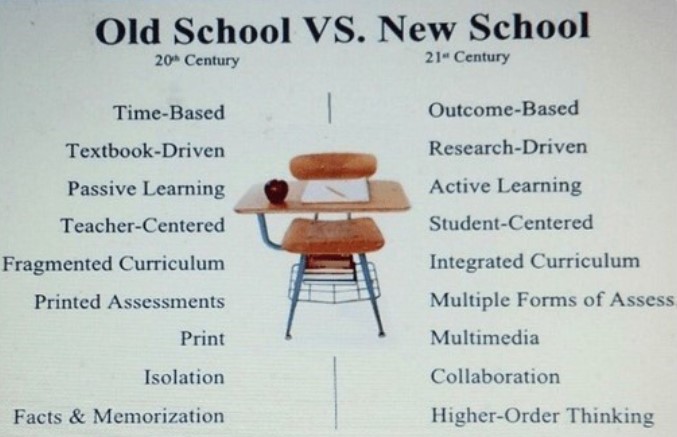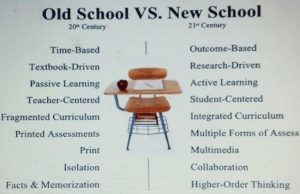
Several Fallacies and the Sesame Street Scapegoat
“We now know that ‘Sesame Street’ encourages children to love school only if school is like ‘Sesame Street.’ Which is to say, we now know that “Sesame Street” undermines what the traditional idea of schooling represents.”
American author, educator, and cultural critic, Neil Postman leaves a wealth of ideas and questions to unpack in his journal article Amusing Ourselves to Death: Public Discourse in the Age of Show Business (1987). How did he define “traditional” schools? What is the philosophy, construct, mission statement of schools that look like Sesame Street? Is Sesame Street to blame, or is a greater villain afoot?
*As a personal sidenote, if he had attacked Mr. Dressup I would’ve revolted!

Lucky to be raised in a world w/ Sesame Street and Mr. Dressup. Photo Courtesy: The Hamilton Spectre
Understanding the quotation’s broader context became essential in my weekly digital dumpster dive. The complete citation of Postman’s Sesame Street/AV critique reveals an underlying theme: Guilt.
- Parental Guilt: It appears the screen-time debate has been raging since the creation of screens. And educational debates before screens centered on the radio, telegraph, printing press….always something.
- More parental guilt: This time focused on alleviating familial responsibility of foundational literacy and numeracy skills. A modern version of this argument centers on Baby Einstein videos.
If Postman defines Sesame Street as “sit and get” mindless education, what are the central understandings of “traditional school” policies and philosophies he seems inclined to protect?
Setting the Parameters: What are “Traditional” Schools?
Only three classes into my Grad Studies and discussions continually resort to defining and labelling schools as if they were grocery-list items. If I ask – What is a classroom? What is a school? – does a definable measurement appear? One we could agree on? And how do we define “traditional” schools? Do we consider Factory Model schools – heavily reliant on assimilation and auditory processing – as the standard definition? After all, these student-passive models of homogenized information and standardized tests remain the (unfortunate) reality for many. But Postman abhorred mindless, impersonal education, so perhaps traditional schools stretch further back to Socratic methods. Or deviating from Eurocentric viewpoints, traditional education as part of Indigenous Ways of Knowing, oral traditions, and land-based knowledge. Believing in a single construct of traditional schools is our first fallacy. The second is treating Sesame Street and AV technologies as scapegoats for “sudden” passive educational practices when Eurocentric education models have been predominately passive.

Google Slide Courtesy of Clement Hii Co.
Cue the Scapegoats: Sesame Street and the Advent of Audio-Visual
When we consider Sesame Street and its supposed assault on traditional schools, are we centering the argument on Sesame Street programming, or the Audio-Visual (AV) formatting itself? In the recommended TED Talk (2019), Scott Widman outlines the duality of EdTech with clear advantages and disadvantages. Personal bias aside, Sesame Street programming has shown continual digital advantages, being at the forefront of inclusivity, equity, representation, and positive messaging for generations of children (and adults). Visual representation and digital programming about racism, ableism, and gender identity could be viewed as passive information for children…OR as starting points for important family and societal discourse.
Previous arguments centered on AV programs like Sesame Street or Bill Nye the Science Guy (another favourite); today’s debates rage about Smartphones, BYOD, Youtube, Prodigy, Mathletics, Essential Skills Online….the list is endless. Psychologist and educational reformer, John Dewey, argued that educators must balance knowledge delivery with student interest and experience (1902). Today’s youth live in a digital age, but the construct of “digital natives” (or inherent digital understanding) is another fallacy. Author Marc Presnky, who first used the term in 2001, later restructured the concept to include digital wisdom: “A ‘digitally wise’ person not only knows how to use digital technologies but also has a capacity to critically evaluate them, make ethical choices and more pragmatic decisions” (2009). Regardless of outdated, rose-tinted views of traditional schools or the current digital medium in classrooms, it is an educator’s responsibility to foster digital wisdom via intentional EdTech adoption, real-world skills and practice, and critical thinking discussions.
Studying the grander implications of EdTech implementation, however, reveals the true potential villain; not the supposed Sesame Street scapegoat but the consumerist, digitally dividing aspects of EdTech itself.
Villian Revealed? The Shady Side of EdTech
In a follow-up book, The End of Education (1995), Postman further condemns the “false Gods” of technology, but his objections lie in the consumerist, directionless implementation of technology. In Tuesday night’s class, the presentation showed a similar precarious balance between amazing AV platforms and the monetary, polarizing nature of Edtech.
In a previous EC&I 830 blog post, I highlighted the alarming statistics presented by Humans Rights Watch in Students Not Products. During the pandemic, the study analyzed student data acquisition of more than 150 EdTech products recommended by global governments. I encourage everyone to read the report, but some of the more problematic findings were:
- More than 140 EdTech companies directly sent/granted access to children’s data to 196 AdTech companies
- 48/49 countries investigated endorsed at least one EdTech product that risked/infringed on student’s rights (yes, that includes Canada)
- 39/49 countries created their own Edtech products that risked/infringed on student’s rights (again, Canada does not come out favourably)
- 89% of the investigated EdTech products monitored or could monitor child online actively, often secretly or without child/parental consent

Human Rights Watch: Take the pledge, make a stand
This report speaks nothing of the digital divide discussed in various articles/studies/infographics, by recommended podcasters Chey and Pav, or examined in greater detail in my other blog posts. The one truth amongst so many fallacies is that EdTech/Audio-visual platforms/apps are not cheap or free, even when they claim to be. While I do not always agree with Postman, his five things to know about technology change, particularly the construct of “EdTech winners and losers,” remains central to the precarious implications of EdTech.
Final Thoughts or How the Cookie Crumbles, as Cookie Monster Would Say…
For me, the shadow of EdTech consumerism remains only a cautionary disclaimer. Likewise, the nostalgic bias of Postman’s “traditional schools” holds little sway over my teaching pedagogy. In the Effectiveness of Audio-Visual Aids study (2018), researchers concluded what 2.5 years of online teaching confirmed for me: Purposeful audio-visual/EdTech usage can be a conduit for engaging, meaningful teaching and learning practices. Unpacking Postman’s Sesame Street critique and exploring AV applications reveals the greater necessity for modern schools to foster digital wisdom and equity in an evolving digital world.
Points to Ponder
- In the past, when your teachers wheeled the AV cart into the room to show Sesame Street, Bill Nye, or the Magic School Bus was it just mindless fun, or did you actually learn something?
- What professional development did you receive (or wish you’d received) about mindful EdTech AV usage in the classroom?
- What are your favourite AV platforms, apps, etc. that you use to promote digital citizenship and critical thinking skills/discourse?
- Do the engagement and visual advantages of AV outweigh its consumerist and invasive disadvantages?

In answer to my own question. Poem by K.Kipp via BoredTeachers.Com (2020)
A very well thorough out and thorough blog post Kim. I agree that there is no such thing as a “traditional school” as what is tradition varies from place to place and shifts throughout time. What I consider a “traditional school” might look radically different from a student growing up on another continent in a completely different culture. My parent’s definition of a “traditional schooling” would also look radially different than my own. Considering one’s culture as the baseline or “neutral” has a lot of baggage that needs to be unpacked. In my own blog post I mentioned that there is a tendency to assume a false consensus (i.e. we all know something or share some sort of similar experience) when speaking about education. For myself, I believe the pace of change is what makes discussing educational technology difficult – what I knew 5 years ago isn’t terribly relevant to today (outside of my core educational and epistemological beliefs).
With regards to your first question I am not sure that I learned a great deal from educational programming. I don’t think that I would have been able to watch an episode of Bill Nye and then apply my newfound knowledge in a different context. What I did take away from educational programming was a positive disposition toward science and the acquisition of new knowledge. Without looking at reference material I couldn’t list all of Newton’s laws of motion (my subject area is mathematics), however I have a great deal of respect for the scientists and engineers who pursue knowledge in the service of mankind. These shows are not a substitute for personalized instruction (whatever format that takes), but I think they helped me appreciate science and higher learning.
Hi Matthew,
Thanks for sharing. Yes, you are so right about the key takeaways from programs like Bill Nye. It was the joy of learning evident in all these programs that truly shows their importance.
I would agree with Matthew, your post is very thorough and well laid out. Thank you for your insights, as it opened my eyes to more thoughts and concerns than I had thought of. I appreciate you starting with the picture of then vs. now, as I always think it is so interesting to reflect upon that. To answer your first point, I would say for the most part it was just mindless fun. The odd thing from Bill Nye I would have learned; however, I just remember mainly learning the song ‘BILL BILL BILL, BILL NYE THE SCIENCE GUY. Science RULES.’ and us as a class singing it. Your “points to ponder” really put things into perspective and allowed me to think deeper than I was. I truly believe, as a mentor, “we must prepare students for the challenges of being digital natives. It is our responsibility to do what is best for the students as they have access to a phone in their pocket. Utilizing technology is less of a choice and more of a responsibility” (Widman).
Thanks for reading, Raegyn. At first, I thought maybe I too only remembered the theme song for Bill Nye, but – as Matt pointed out – it was actually a love of learning prompted by these fun, educational shows.